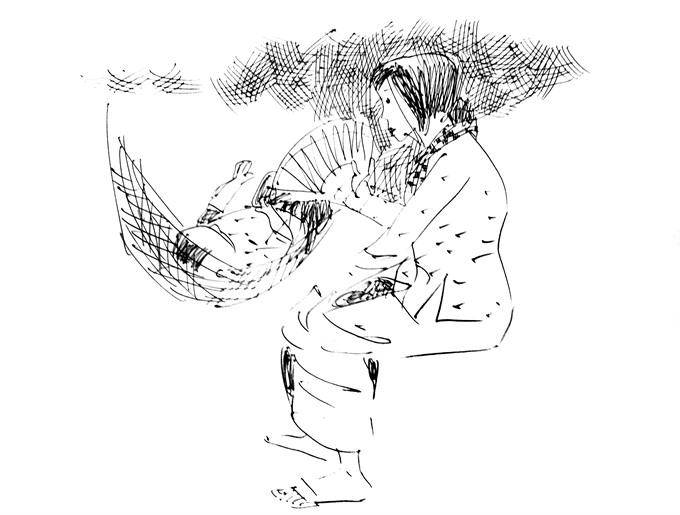

A short story by Nguyễn Ngọc Đào Uyên
 |
| MHT |
by Nguyễn Ngọc Đào Uyên
The wind carries cây cải vegetables up to the sky,
Leaving rau răm spice herbs behind with a bitter cry…
Nhí tried to lull her baby to sleep with these lines from a traditional song. Suddenly, she was struck by significance of the sad lullaby to her childhood.
Nhí’s mother died when she was a baby. In her adolescence when other kids returned home with their mothers to have dinner or a bath and play with their siblings, Nhí, hugged a pillar alone, staring at the courtyard, weeping in self-pity. Worse still, whenever she was ill, she craved paternal care in vain.
Now, she had dedicated herself to her daughter Nị. Watching her little one sleeping with her rosy lips slightly ajar filled her heart with job.
“The child and her father Quân are like two peas in a pod,” her neighbours often said.
Nhí loved her husband dearly. He had built a cosy nest for their house, the home she had always dreamt of.
But nothing is perfect, not for any man woman or child.
* * *
“Why hasn’t he come back home with the rice plants this evening?” Hai asked herself.
Behind the veranda, a strong gust of wind makes bananas moan;
Infatuated with his concubine, he leaves his kid alone…
While Hai was lulling her baby to sleep, she thought about the five endless days she had spent longing for her husband Tú’s return. By chance, one of her neighbours saw him with a prostitute. Hai had searched for the unfaithful cad. One evening, she stumbled upon the couple. When Hai stopped them in the street to attack the whore, she was stunned to be beaten black and blue by her husband.
After that Tú did not come home. He just stayed with his girlfriend in the next hamlet.
“Forget about him, dear. What’s the use of an unfaithful man?” said one of her friends. On the contrary, another advised her, “He’ll come back eventually because hos like that bitch only want young bucks, he’ll not be able to satisfy her.” “You must think of your little girl,” Tú’s mother advised her. Hai was deeply ashamed and worried her husband had fallen in love with the harlot Thu.
“Is Tú no longer interested in me?” Hai asked herself.
The next morning, Tú slammed the door open.
“Thu and I have been in love for a long time,” Tú told his wife. “Look at the mess we’re in, either we keep living together or we go our separate ways, either way I’ll keep seeing Thu,” he declared.
“What do you mean?” Hai stuttered.
“Either we continue co-habiting or get divorced.”
His words stabbed at Hai like a thousand knives.
One afternoon, their neighbours heard a commotion and the child’s cries. They rushed towards the house. They saw Tú leaving and Hai lying in a pool of blood, weeping bitterly.
“What a brutal scoundrel!” said one of them.
They had thought Hai’s good behaviour and their little girl might make Tú change his ways, yet nothing could be further from the truth. That night, Hai’s sobs echoed loudly across the village.
A few days later, Hai breathed her last.
Her neighbours were stunned. “How did she die?”, “How could this happen?”, “How will little Nhí survive?” and so on.
“It’s none of your business!” said one old woman. “Can any of you let the poor little thing suck your breasts? She’s thirsty,” she added to silence the vultures.
Nhí had been left alone at only five months old after her young mother killed herself by drinking a bottle of insecticide.
Hai’s funeral took place on a misty and chilly afternoon in front of many mourners. Some of them poured earth into the grave, while others put a fresh flower in. They left the burial ground at twilight while clusters of banana and bamboo were trembling in the wind.
* * *
Thu became Tú’s common law wife and Nhí’s stepmother. Thu received a cold welcome when she moved in with Nhí’s father.
“I had only one daughter-in-law,” Tú’s mother, Nga, said to her. “No one could replace her. As for, Tú he won’t be faithful to you either.”
Walking across the low hibiscus hedge separating her house from Tu’s, she warned Thu, “Hai’s soul remains here. In time, she will punish you both.”
Thu smiled scornfully and said nothing.
“Mom’s warning doesn’t mean much,” Tú told his new woman. “Ignore her, my darling. My love for you is so much stronger,” Tú said to her. “Come into your new house,” he said, pulling her in.
Walking past the altar with Hai’s portrait, Thu felt very nervous. “Hai just looked at me with hate,” she told Tú.
Since Thu began staying with Tú, she had horrible nightmares. In her dreams, Thu often found Hai, hair unkempt, standing outside the mosquito net or at the doorway, or lying in the hammock, wiping away her tears or staring at the sleeping couple.
“We should build a new house instead of living here with her ghost,” Thu told her darling. He nodded his agreement. They destroyed the house together with all traces of Hai. Soon, a new building with brick walls and fancy tiles was ready. In the meantime Tú’s rice fields grew smaller and smaller and his wealth shrunk, much to the regret of his relatives.
Many thought Thu would abandon her lover once Tú’s property had all gone. Yet, one year, two then three years, when Nhí was nearly five years old, she was still around. Tú decided to give his little girl to Thu’s mother, knowing he couldn’t provide the life she deserved. “My mother is too old to look after her and my uncles and aunts are too busy. I want her to be a good girl,” Tú thought to himself.
With Thu’s mother, Nhí began to do her homework and excelled at school.
“Bless Hai’s soul,” old Nga prayed.
To everybody’s surprise, Thu remained by Tú’s side for many years despite his continued infidelity. Sometimes, she kicked up a fuss about his bad behaviour. But to no avail.
“This house cost a lot of my money and effort. What’s the use of abandoning him?” she said to herself.
* * *
As for Nhí, she was miserable before meeting Quân. She had refused to see Tư at all because of how he had hurt her mother.
So naturally, Nhí nearly fainted when she heard her husband had a mistress too. She had thought Quân was different from her father, a faithful man. She realised he was also a flirt and obsessed with young and pretty girls. When he was away from home for days at a time going God-knows-what she was at her wit’s end. She wanted to let things run their course, yet when she thought of her little Nị, she decided to stand up.
“Make a choice: either me and our little child or that whore,” Nhí told Quân. She knew that she shouldn’t leave the house, as in her view, it was a woman’s castle. When Nị was four months old, she asked her husband’s sister to look after her while she learned how to be a bricklayer. “I’ll have to provide for my kid, with or without him.” she whispered to herself.
In her heart of hearts, Nhí knew that her husband’s woman would soon give him up as love was one thing, but being a wife was another matter, much more difficult.
* * *
Nhí had never understood why Thu stayed with her father despite the way his relatives treated her. Meanwhile, her lover, often away from home, got his kicks in other women’s’ pants. She pitied Thu when she learned she lived alone, surrounded by bitchy neighbours. Nhí dropped in on her often.
“Have dinner with me, I insist. Why don’t you take Nị?” Thu said to her.
Unfortunately for Thu she had been unable to have a child.
“That’s her fate!” remarked one of the villagers. “She’s paying for stealing Nhí’s father away.”
Nhí saw her stepmother was miserable. She greatly looked forward to her husband’s homecoming, night after night. She craved hearing his unsteady steps in the dark. Nhí glanced at Nị as she slept. She hoped that her little one would never experience any suffering in her childhood.
That afternoon, Nhí went to the local health centre for a painkilling injection because over the past three days she could barely breathe. She felt something heavy squeezing her heart hard. She was having a heart attack. Her whole body was soaked in sweat. She rushed towards the gate.
“Can anybody help me?” she shrieked.
A woman came to her rescue. She wiped Nhí’s face and applied some oil to her temples. Nhí turned to her little Nị. It seemed to her that someone was standing before her, it was her mother’s silhouette. The ill-fated young woman swept her hand over her daughter’s head. Meanwhile, in the dim light, Nhí heard crying. They were not Nị’s. They were hers! Then amid the howl of a cold wind, she recognised the cries of little Nị. She ached to gather her up in her arms and comfort her, but couldn’t.
“Her lower jaw has gone stiff,” remarked one person.
“Call an ambulance to take her to hospital,” said another.
“Phone her husband to tell him to come home immediately,” urged another.
“Dear Nhí, stay with your little child. She needs you,” moaned an old woman.
It seemed to Nhí that she was being pulled into an empty room, where there was neither sound nor light.
* * *
Early the next morning, Nhí’s body was taken home from the provincial hospital.
Quân sat silently beside his wife, like a statue, while little Nị played next door. A white hat was placed at Nhí’s feet, where donations, mostly small though, were dropped in. In that poor village, sympathy was valued more than money.
According to the hospital doctors, had Nhí suffered from a massive brain hemorrhage.
“Nhí, how could you leave your kid alone?” cried Quân’s sister. Then turning to him she cursed him, “She died alone and in pain you know. When she was ill, you paid no attention to her health. What kind of a man are you?” she added.
After Nhí’s death, inside the house, cold and dismayed, Quân lived alone with his little daughter.
“In my dreams, I see Nhí standing beside my bed, asking me to give my breast milk to her child,” disclosed one young woman. “So do we,” chimed in her friends. “Quân once told me that if he remarries, his new wife will have to love his daughter dearly. Maybe, Nhí’s soul will bless both of them,” a woman declared.
Translated by Văn Minh




